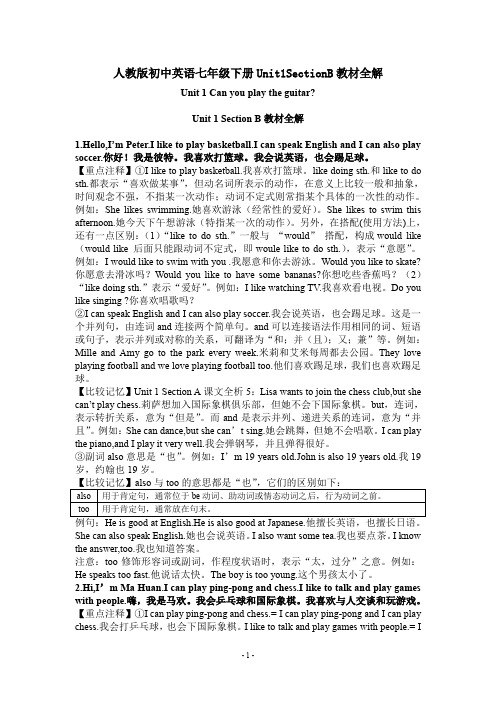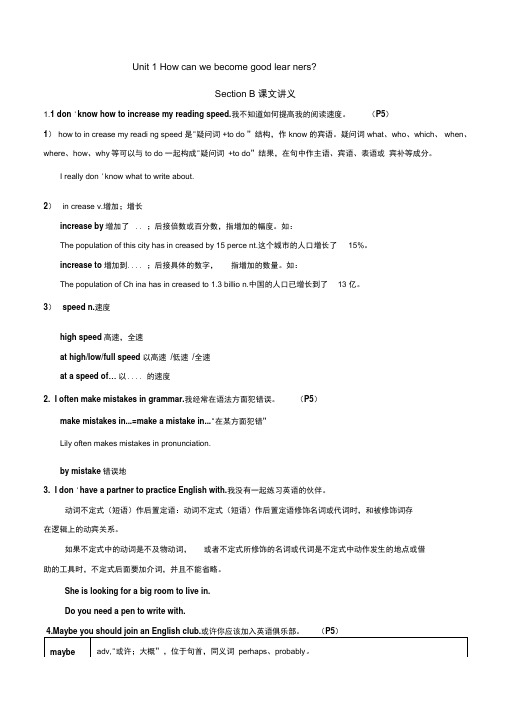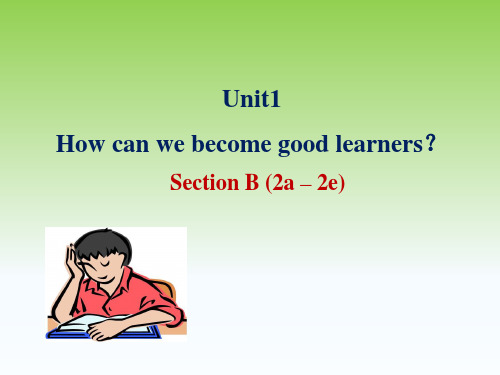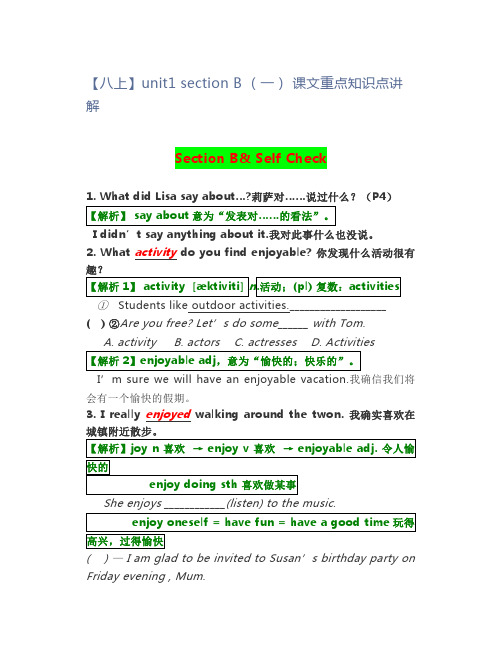Unit1_SectionB_语境法讲解单词
(完整版)人教版初中英语七年级下册Unit1SectionB教材全解

人教版初中英语七年级下册Unit1SectionB教材全解Unit 1 Can you play the guitar?Unit 1 Section B教材全解1.Hello,I’m Peter.I like to play basketball.I can speak English and I can also play soccer.你好!我是彼特。
我喜欢打篮球。
我会说英语,也会踢足球。
【重点注释】①I like to play basketball.我喜欢打篮球。
like doing sth.和like to do sth.都表示“喜欢做某事”,但动名词所表示的动作,在意义上比较一般和抽象,时间观念不强,不指某一次动作;动词不定式则常指某个具体的一次性的动作。
例如:She likes swimming.她喜欢游泳(经常性的爱好)。
She likes to swim this afternoon.她今天下午想游泳(特指某一次的动作)。
另外,在搭配(使用方法)上,还有一点区别:(1)“like to do sth.”一般与“would”搭配,构成would like (would like 后面只能跟动词不定式,即woule like to do sth.),表示“意愿”。
例如:I would like to swim with you .我愿意和你去游泳。
Would you like to skate? 你愿意去滑冰吗?Would you like to have some bananas?你想吃些香蕉吗?(2)“like doing sth.”表示“爱好”。
例如:I like watching TV.我喜欢看电视。
Do you like singing ?你喜欢唱歌吗?②I can speak English and I can also play soccer.我会说英语,也会踢足球。
新目标九年级英语Unit1SectionB课文讲义

Unit 1 How can we become good lear ners?Section B 课文讲义1.1 don 'know how to increase my reading speed.我不知道如何提高我的阅读速度。
(P5)1)how to in crease my readi ng speed 是"疑问词+to do ”结构,作know 的宾语。
疑问词what、who、which、when、where、how、why等可以与to do 一起构成"疑问词+to do”结果,在句中作主语、宾语、表语或宾补等成分。
I really don 'know what to write about.2)in crease v.增加;增长increase by增加了.. ;后接倍数或百分数,指增加的幅度。
如:The population of this city has in creased by 15 perce nt.这个城市的人口增长了15%。
increase to增加到.... ;后接具体的数字,指增加的数量。
如:The population of Ch ina has in creased to 1.3 billio n.中国的人口已增长到了13 亿。
3)speed n.速度high speed高速,全速at high/low/full speed 以高速/低速/全速at a speed of… 以.... 的速度2. I often make mistakes in grammar.我经常在语法方面犯错误。
(P5)make mistakes in...=make a mistake in..."在某方面犯错”Lily often makes mistakes in pronunciation.by mistake错误地3. I don 'have a partner to practice English with.我没有一起练习英语的伙伴。
人教版英语八上_Unit1_SectionB_语境中学单词

(出于爱好的) 活动
outdoor activities 户外活动
处于活跃 的状态
(有组织、有目 的的)活动
(正在进行的或正 在做的)活动
fund-raising activities 筹资活动
physical activities 体育活动
网络 义
activity
语
decide[dɪ'saɪd] v.决定;选定
网络 义
decide
语
词形词块拓展
decide (1)________d_e_c_i_s_io_n_________n. 决定,抉择 ① ___m__a_k_e_a__g_o_o_d_d_e_c_i_si_o_n___作出一个明智的决定 ② __m_a_k_e__o_n_e_'s__o_w_n__d_e_c_is_i_o_n_某人自己做决定 (2) ___d_e_c_i_d_e_(n_o_t_)_t_o_d_o__s_th__. __决定(不)做某事 (3) ____d_e_c_id_e__o_n_/u_p__o_n_s_t_h_. ___决定某事 (4) _d_e_ci_d_e_w__h_i_ch__o_n_e__to__c_h_o_o_s_e决定选择哪一个
例句 Is it the tallest building in this city?
译 这是这个城市最高的建筑物吗?
词根 build(建造)+ ing(名词后缀,加在动 词后,表示总称)→建筑物
trader['treɪdə(r)] n.商人
辨析 trader指从事贸易工作的人,也指贩子。 businessman指有经验、善于经营、从事各种买卖活动的买卖人、实业家。
(3) _____c_r_e_a_te__a_w__o_n_d_e_r_____创造奇迹
九年级英语Unit1_SectionB(2a-2e)

_____ words or _____ ______ _______ .
2a What good learning habits can you think of? Discuss them with your partner.
to learn English and they like music or sports, they can listen to
English songs or watch sports programs in English. This way they
will not get bored. 感到无聊
will forget it ______ you use it.
❖ 3. 好的学习者也不害怕犯错误。Good learners are also _____ ______ ______ making _______ .
❖ 4. 他尝试了许多次成功了,并且从错误中学到很多。 He succeeded by _____ _____ _______ and ____ ______ his mistakes.
4. Do good learners learn from mistakes or are they afraid of making mistakes?
5. What study skills does the writer talk about? Do you have those study skills?
B: Maybe you should join an English club.
【八年级上册】unit1sectionB(一)课文重点知识点讲解

【八上】unit1 section B (一)课文重点知识点讲解Section B& Self Check1. What did Lisa say about…?莉萨对……说过什么?(P4)I didn’t say anything about it.我对此事什么也没说。
2. What activity do you find enjoyable? 你发现什么活动很有① Students like outdoor activities.___________________ ( ) ②Are you free? Let’s do some______ with Tom.A. activityB. actorsC. actressesD. ActivitiesI’m sure we will have an enjoyable vacation.我确信我们将会有一个愉快的假期。
3. I really enjoyed walking around the twon. 我确实喜欢在Friday evening , Mum.—_______ yourself, dear! But remember to be back before 10 o’clock.A. HelpB. BelieveC. MakeD. Enjoy【2014贵州六盘水】24. Children always have a good time at the Wetland Park(湿地公园) ofLiu Panshui.A. enjoy themselvesB. help each otherC. look beautifulD. have a big dinner3. I arrived in penang inMalaysia this morning with my family.今早我和我的家人到达了马来西亚的滨城。
人教版八年级英语上册优秀教学案例:Unit1SectionB(1a2e)

4.增强学生的自信心,鼓励他们积极参与课堂活动,勇于表达自己的观点。
5.培养学生的跨文化意识,了解不同国家的文化差异,尊重各国文化。
三、教学策略
(一)情景创设
为了让学生更好地融入本节课的学习,我将采用情景创设法,设计一系列与学生的日常生活密切相关的场景。例如,通过展示学生们熟悉的校园生活片段,如晨跑、上课、吃午餐、课外活动等,引导学生用英语描述这些场景,自然引入本节课的主题。这样的教学设计既能够激发学生的学习兴趣,又能使他们感受到英语学习的实用性和趣味性。
3.听力训练:播放Section B的听力材料,让学生跟随录音,完成1a-1d的练习。在此过程中,指导学生抓住关键信息,提高听力技巧。
(三)学生小组讨论
1.小组活动:将学生分成若干小组,让他们根据听力材料,讨论并完成2a-2d的任务。每个小组成员都要分享自己的生活习惯,并学会用英语描述。
2.口语交流:组织小组间的口语交流,让学生们互相询问和回答关于日常生活习惯的问题,提高口语表达能力。
二、教学目标
(一)知识与技能
1.掌握本节课的核心词汇和短语,如"exercise, usually, often, never, once a week"等,并能正确运用这些词汇描述自己的日常活动。
2.学会使用"How often..."提问并回答关于频率的问题,掌握一般现在时态的用法。
3.能够听懂并理解Section B中的听力材料,获取关键信息,提高听力技巧。
4.通过小组合作,学会与他人交流,分享自己的生活习惯,培养口语表达能力。
5.提高阅读理解能力,理解文章主旨,抓住文章细节,并能运用阅读策略进行分析。
初中英语 人教版九年级上册Unit1 sectionB知识点(词+句+语法)
人教版九年级上册Unit1 sectionB知识点词汇用法讲解1.improveimprove既可以作及物动词,也可以作不及物动词,意为“改进,提高,改善”,表示某事或某种情况逐渐好转。
例如:Their French has improved a lot. 他们的法语进步很大。
We haven’t discovered how to improve it.我们还没找到如何改进它的办法。
You’d better work out a plan to improve your writing skills.你最好制定一个提高写作能力的计划。
We are always seeking to improve productivity.我们一直在设法提高生产率。
2.discoverdiscover通常用作及物动词,主要用法有:(1)表示“发现”某一具体的东西,后接名词或代词作宾语。
例如:Who discovered America? 谁发现了美洲?It was discovered among waste paper. 这是在废纸中发现的。
(2)表示“发现”某一情况,其后可以接名词或代词作宾语,也可接复合宾语或特殊疑问词+不定式作宾语。
例如:We soon discovered the truth. 我们很快发现了事实真相。
We discovered her to be a good cook. 我们发现她很会煮饭。
We haven’t discovered how to improve it. 我们还没找到如何改进它的办法。
辨析:discover,find及invent(1)discover意为“发现,发觉(原先没看见或不知道的事物)”。
He discovered electricity. 他发现了电。
(2)find 意为“找到;得到,求得”。
I can find the answer to the question. 我找到了问题的答案。
仁爱版英语九年级上册Unit1 Topic2 SectionB 重难点讲解
SectionB 重难点讲解【1】And it is increasing by 80 million every year. 并且它(世界人口)正在以每年8000万的速度增长。
(教材P11)increase为动词,意为“增加,增大(数目)”,构成短语increase by, increase to (1) increase by后加倍数或百分数,意为“增加了……倍/百分之…”。
如:The population has increased by 2% in this country. 这个国家的人口已经增加了2%。
(2) increase to后接具体的数字,意为“增加到了……”。
如:His salary increased to 10, 000 yuan a month.他的月薪增加到了1万元。
【2】What’s the population of the USA?美国的人口是多少?(教材P11)population不可数名词,意为“人口,人口数”。
作“人口数”讲时,相当于the number of 故针对人口数量提问时用What’s the population of ...? 而不能用how many。
通常用big/large,small来修饰人口数的多少。
具体的人口数用“has a population of +数字”来表示。
如:China has a population of about 1.3 billion.中国大约有13亿人口。
【3】Luckily, China has already carried out the one-child policy to control the population. 幸运的是,中国已经实施了独生子女政策来控制人口增长。
(教材P11)carry out 实行,实施,执行。
如:This is a new policy, and they will carry it out next year. 这是一项新政策,他们将在明年实施它。
人教版八年级上册英语Unit1 SectionB词汇点睛
词汇点睛一、基础词汇1、活动2、决定3、试图、努力4、写5、自行车6、楼房7、想知道8、不同、差异9、顶部10、等待11、雨伞12、湿的13、在…以下14、足够的15、饥饿16、感受到17、如同18、鸭子19、不喜欢二、重点词汇讲解1、decidedecide为动词“决定”,常构成词组decide to do sth和decide on sth,其名词形式为decision,常构成词组make a decision to do sth(决定做某事)相当于decide to do sth, decide后面也可接从句。
decide后面还可跟“疑问词+动词不定式”结构。
Eg:I decided to find a part—time job.In the end, she decided on the red skirt.The little girl can’t decide what to do.2、try(1)try为动词“试图”、“努力”,常构成词组try to do sth和try doing sth,两者的区别在于try to do sth强调付出一定的努力设法去完成,而try doing sth则不一定付出很大努力。
Eg: I tried hard to improve my spoken English.(2) try还可以构成词组try one’s best to do sth尽某人全力去做某事。
Eg: We should try our best to practice speaking English.(3) try还可作句词“尝试”。
Eg:Let’s have a try.3、wonderwonder为动词“想知道”后面通常接从句。
Eg: I wonder who he is.4、differencedifference为可数名词“不同,差异”,其形容词形式为different,常构成词组be different from和…不同。
人教版新目标九年级英语Unit 1 Section B单词讲练
Unit 1 How can we become good learners?Section B单词讲义A.讲解部分1. increase v. 增加;增长【短语辨析】increase by增加了……;后接倍数或百分数,指增加的幅度。
如:The population of this city has increased by 15 percent.这个城市的人口增长了15%。
increase to增加到……;后接具体的数字,指增加的数量。
如:The population of China has increased to 1.3 billion.中国的人口已增长到了13 亿。
2. speed n. 速度【短语】high speed 高速low speed 低速,慢速at a speed of…以……的速度3. born v.出生/ adj.天生的(1)born做动词时,意为“出生”,是动词bear的过去分词,常与系动词be连用,后跟介词in (+大地点/年/月/年月),on (某日)或at (具体时刻)。
be born后跟介词in/into/to时,表示“降生到某家庭”。
表示某人出生于某时或某地时,只能用一般过去时态。
如:I was born at 6:00 in the morning in a small village.我早上6:00出生在一个村庄里。
(2)born做形容词时,意为“天生的”,常用短语为:be born with (生而具有;生就)。
如:He was born with a good memory.他生来记性就好。
4. ability n.能力;才能【复数】abilities常用短语:the ability to do sth. 做某事的能力5. create v. creative adj. 有创造力的creation n. 创造;创作6. active adj. 活跃的;积极的→v. act 行动;扮演→n. action 行动;活动actor 男演员actress 女演员→adv. actively 活跃地;积极地【短语】take an active part in 积极参加7. connect v.(使)连接;与⋯⋯有联系→connection n. 连接connect是动词,意为“(使)连接;与……有联系”,其过去式和过去分词是connected。
- 1、下载文档前请自行甄别文档内容的完整性,平台不提供额外的编辑、内容补充、找答案等附加服务。
- 2、"仅部分预览"的文档,不可在线预览部分如存在完整性等问题,可反馈申请退款(可完整预览的文档不适用该条件!)。
- 3、如文档侵犯您的权益,请联系客服反馈,我们会尽快为您处理(人工客服工作时间:9:00-18:30)。
situation [sɪtʃu'eɪʃn] n. 情况; 状况
例句 The situation became worse and worse.
编码 situat(看作situate,位于)+ ion (名词后缀,表示状态)→形势
him that he needs to get his act together.
熟词生义
importance [ɪm'pɔ:(r)tns] n. 重要性; 重要
用法 important adj.重要的
例句 The matter is of great importance to us.
编码 import(看作important,重要的)+ ance(名词后缀,表示性质)→ 重要性
编码 our(我们的)+ selves(self的复数形 式,自己)→我们自己
climber ['klaɪmə(r)] n. 登山者; 攀登者
用法 词形拓展:climb v. 攀登, 爬 例句 Peter is a climber.
编码 climb(攀登)+ er(名词后缀表示人) →攀登者
risk [rɪsk ] n. & v. 危险; 风险; 冒险
用法 固定搭配:take a risk/take risks 冒险 例句 I’m taking risks.
比较 风险(risk)上升(rise)。
accident ['æksɪdənt] n.(交通)事故; 意外遭遇
用法 固定搭配:by accident 偶然;意外地
例句 She broke a leg in an accident.
control [kən'trəʊl] n.&v. 限制; 约束; 管理
用法 固定搭配:be in control of 管理,支配;be out of control 失控
例句 Everyone was too afraid to go in because the fire was out of control.
比较 一只cock(公鸡),穿着sock(短袜), 被人lock(锁上),推上rock(岩石)。
knife [naɪf] n.(pl. knives /naɪvz/) 刀
用法 复数形式:knives
例句 The waiter puts a fork and two knives on the dinner table.
对某人重要
①Your friendship means a great deal to me.
吝啬的
②She’s always been mean with money.
刻薄的
③If your friend is being mean or unkind for no reason, then you can tell
decision [dɪ'sɪʒn] n. 决定; 抉择
用法 同根词:decide v. 决定 固定搭配:make one’s decision 做某人自己的决定
例句 He knew that it was impossible to change the decision.
编码 deci(看作decide,决定)+ sion (名词后缀,表示行为、状态)→决定
Unit1 SectionB 语境法讲解单词
sick [sɪk] adj. 生病的; 有……病 例句 Are you sick?
比较 挑选(pick)出没有生病的(sick)同学去踢球(kick)。
knee [ni:] n. 膝; 膝盖
例句 I fell down and hurt my knee.
例句 His face was sunburned.
编码 sun(太阳光)+ burn(烧)+ ed(的) →被太阳光烧伤的,简称“晒伤的”
ourselves [aʊə(r)'selvz] pron. (we的反身代词) 我们自己
用法 固定搭配:by ourselves 我们自己
例句 We have to find ourselves a new home.
用法 固定搭配: mean to do sth. 打算做某事 mean doing sth. 意味着做某事
例句 The red light means “Stop”.
比较 方法论是指(mean)看待事物的方 法(means).
mean [mi:n] v. (meant /ment/) 意思是; 打算; 意欲
用法 breath n.呼吸,气息
hold one’s breath 屏住呼吸
例句 I can hardly breathe.
编码 动词的呼吸(breathe)就是名词的 呼吸(breath)尾巴上加个e。
sunburned ['sʌnbɜ:(r)nd] adj. 晒伤的
用法 固定搭配:get/be sunburned 晒伤
kilo (=kilogram) ['ki:ləʊ] n. 千克; 公斤
用法 同根词:kilometer n.千米;公里
例句 Her weight has increased to 70 kilos. 比较 kilo = kilogram
rock [rɒk, rɑ:k] n. 岩石
例句 Don’t rock the boat. 不要兴风作浪。
比较 妻子(wife)拿着小刀(knife)切水果。
blood [blʌd] n. 血
例句 Too much noise can cause high blood pressure as well.
联想 bloo(形似数字6100)+d(拼音:滴) →有6100滴“血”。
mean [mi:n] v. (meant /ment/) 意思是; 打算; 意欲
比较 膝盖(knee)受伤,不能自由(free) 活动,躺在树(tree)下休息。
nosebleed ['nəʊzbli:d] n. 鼻出血
例句 I had nosebleed earlier today. 编码 nose(鼻子)+ bleed(流血)→鼻出血
breathe [bri:ð] v. 呼吸
